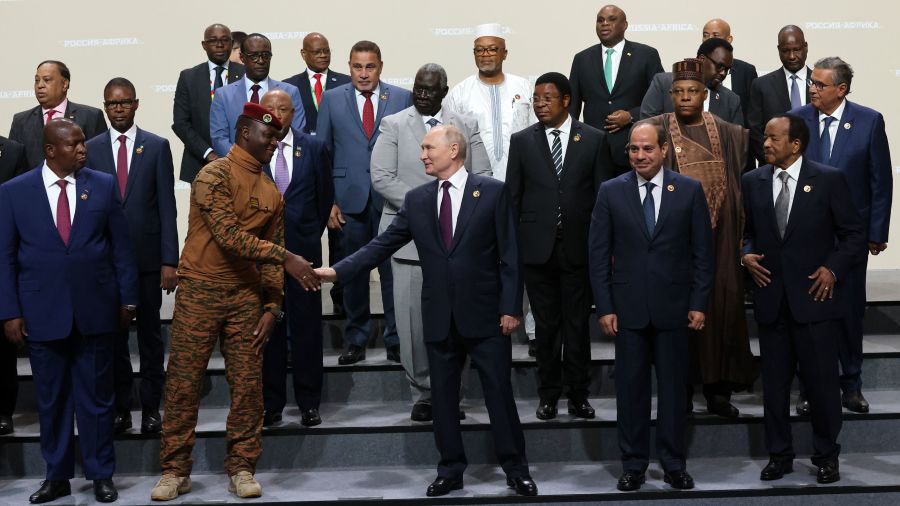Ostracized by the West for his expansionist war against Ukraine, embattled Russian President Vladimir Putin is looking for new friends. In his famous examination of the trouble with Nigerian society in 1989, Chinua Achebe noted that “one of the penalties of exalted power is loneliness.”
Achebe had indeed mirrored the fate of men like Putin well before they knew what political power is and what acquiring too much of it can do to the head. The stuff of the arts, that one.
Last month in July, Putin hosted a delegation of African heads of state and policymakers in St. Petersburg for the second time in four years. He spoke highly of Africa, repeatedly referring to the delegates as “friends” as he carefully dangled the carrot before their noses.
As is the habit of most benevolent dictators, he didn’t forget to throw in some goodies, including offering to deliver “free” food to the borders of, among other countries, Burkina Faso and Zimbabwe. Sometimes it is essential to go out of your way to convince someone to be your friend, especially if they have a good reason not to. And, as a proper benevolent dictator on a charm offensive, he wrote off Somalia’s $684 million debt in the spirit of appreciating the difficult period Somalia has weathered for the last three decades.
While this development sounds like great stuff, especially to Africans affected by hunger, there is reason to be apprehensive. We have been here before. There is no such thing as free lunch. Suppose you understand how Europe laid the foundation for Africa’s eventual violent exploitation through colonialism. In that case, you can see what Putin is trying to do: entrench Russia’s presence in the continent through things like “free” grain for eventual economic exploitation.
And it might just work. It is currently estimated that at least 140 million Africans are affected by severe food insecurity, with the situation expected to worsen, seeing as regions like East Africa are likely to have low harvests. The last time a foreign country came to Africa bearing goodies, we lost immense wealth, our social and political systems were disrupted, and our self-esteem suffered irreparable damage.
Africa’s Rich Civilizations Before European Colonization
In the early 16th century, when the first colonial agents, mainly traders, missionaries, and explorers, arrived in Africa, they found an already advanced society with well-established institutions of administration that covered all aspects of life according to the community’s needs. Such institutions did not come out of the blue. They were established and supervised by traditional authorities such as the early African empires, including the Ashanti, Buganda, Luba-Lunda, Ghana, Mali, Songhai, the East African Coastal Swahili City States, Maravi, and many more. These empires had already established trade links with the Middle and Far East before the arrival of Europeans.
Africa was densely populated before the slave trade, which significantly devastated the continent, destroying states and civilizations, depopulating vast regions, and leading to disastrous underdevelopment. Some kingdoms and empires had already advanced enough to become stable polities.
Those who argue that colonialism brought development, such as roads, schools, and railway lines, to Africa are grossly misguided. The infrastructure that Europeans established in Africa was meant to facilitate the goal of exploiting Africa. At any rate, infrastructure, such as roads, was not new to Africa. The Bugandan state, for instance, had constructed an extensive system of roads before their contact with the colonizers.
Gold, Exploitation, and Africa’s Forgotten Wealth
In short, Europe did not bring any civilization to Africa. On the contrary, Europe destabilized and exploited Africa. Colonial Europe did not find Africa lacking in administrative systems and culture, as has been widely alleged.
When the first Europeans arrived in East and West Africa, they found that the gold business, for example, had already been established in these areas. When the Arabs arrived in North Africa in the late 17th century, they found gold beyond the desert, which the prosperous Sahelian kingdoms traded. They immediately embarked on a process of finding its source to entrench control.
Moreover, even more, expansive roads, such as the Trans-Saharan trade networks in West Africa and the route from the Swahili City States to Zimbabwe and the DRC, were established many centuriesIt’sore the Europeans set foot in Africa.
It’s safe to conclude that gold technology was generated in Africa, considering Europe did not have its gold mines. To this day, the same style of siphoning unquantifiable wealth from Africa to Europe can be seen in the ongoing unequal trade between the two continents. Even though Europe has never acknowledged this fact, there is overwhelming evidence to prove that it intruded economically on Africa during the “gold economy.”
With the original design of colonialism out of fashion, the so-called Global North has devised new ways to lord it over their former colonies. Russia may not have participated formally in the mass exploitation doesn’t during colonialism, but that doesn’t mean it is not interested in joining the West in its modern-day exploitation” perpetrated through things like “free” grain.

